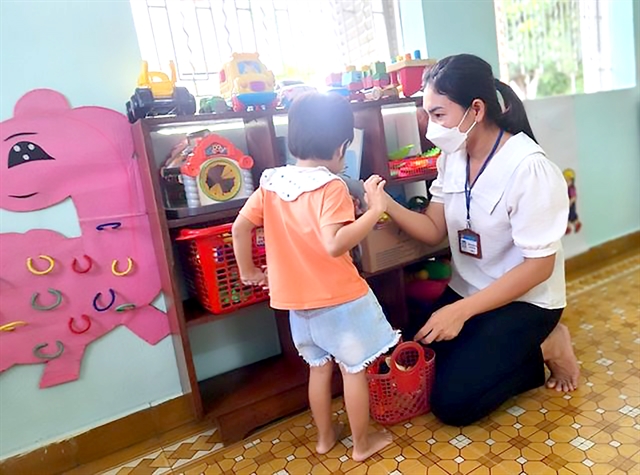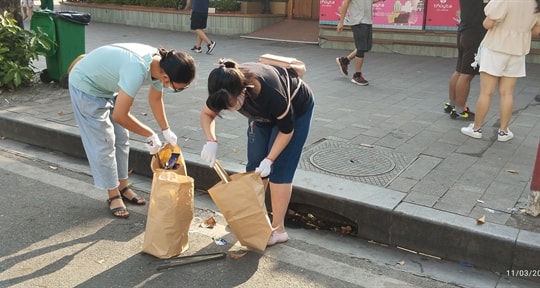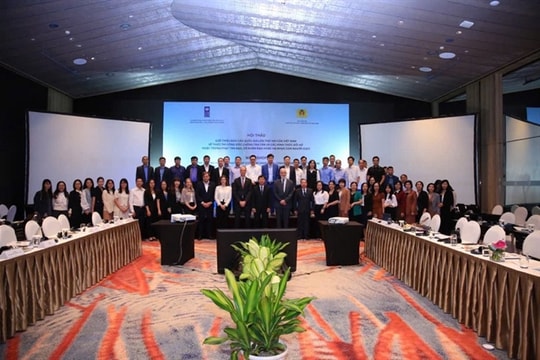 |
| Đặng Thu Nga takes care of a child in the village. — Photo suckhoedoisong.vn |
HCM CITY — Family plays a very important role in the formation and development of children's personality, but there are many unfortunate children who are orphans and need protection and help.
Nearly 50 years since its establishment, the Thủ Đức Youth Village in HCM City has cared for and raised tens of thousands of orphans and disadvantaged children from across Việt Nam.
Although less fortunate than their peers, with the love, care, help and education of the staff of 'fathers' and 'mothers' here, the children have overcome difficulties and pressures in life to continue writing their dreams.
Every meal, every sleep, every lesson, the children here are taken care of by the village’s staff as if they were their own children.
They are able not to just study up to high school, but also go to university or study at vocational schools.
Nguyễn Hữu Tài, Director of the Thủ Đức Youth Village said: "I can't count how many teachers, doctors and bank officers have come from here. There are also many children who have finished school and become successful in life. A great number of them decide to return here to take care of children with the desire to give love for children in the same situation as themselves."
Back 'home'
One child who received love, care, nurturing and education from mothers in the village, Đặng Thu Nga, 36, after working as an accountant, decided to return to work in its newborn ward.
"Although I have been working outside for a long time, I still continue to receive help from everyone in the village, so I learnt more knowledge related to infants and preschool children to return and contribute to the village," said Nga.
Nga said that it was difficult to take care of normal children, but it is much more difficult to take care of children with rare diseases.
Children in the village are separated according to their physical condition. The ones with congenital disabilities or developmental disorders will be arranged in a class with special care and teaching.
Nga believes that children who need intervention must be taught with special lesson plans. However, the village’s staff do not have much knowledge and experience in caring for such children, so their work meets many obstacles.
Understanding that, the village’s Board of Directors has invited specialised teachers and doctors to train staff who directly teach and care for special children.
Phạm Thị Trang, 31, from Nghệ An central province, chose the Thủ Đức Youth Village as her long-term workplace after graduating.
She said that she and most of workers here are preschool or primary school teachers, so when she was assigned to teach children in need of intervention and the ones with developmental disorders, she thought this job would not be too difficult.
However, reality has shown teachers that raising the special children is very difficult.
Most of them are not able to control their behaviour, so the teachers cannot understand their thoughts and wishes. Therefore, in addition to basic knowledge, teachers here have to explore to know the personality of each child in order to come up with appropriate educational methods.
"After participating in the intervention class, many children have clearly changes, reacting quickly and can follow commands. We are overwhelmed by the children's progress. The children’s positive changes have created great motivation for us. We hope that they can integrate into life, go to school like their peers and can be independent when they grow up," said Trang.
Golden time
Regarding intervention for children with developmental delays, Nguyễn Trần Nam, Deputy Director of the HCM City Children's Hospital, said that many psychological reasons made children slow to speak such as expressive language disorder and autism.
A lot of clinical data shows that before three years old is the so-called golden time to intervene children with developmental problems.
Therefore, taking children to medical facilities with psychological specialists for examination and assessment is necessary to guide appropriate solution.
"Early intervention helps children better their language and communication skills, creating a solid foundation for their future,” he said.
As for the team directly instructing children, it is necessary to be equipped them with theoretical and practical knowledge. If they do not have enough, they can supplement it during their working process, said Nam.
Director Tài affirmed that the village’s staff always tried their best, with enthusiasm, love for children and a sense of responsibility to take care of and bring the best things to the children. — VNS
























